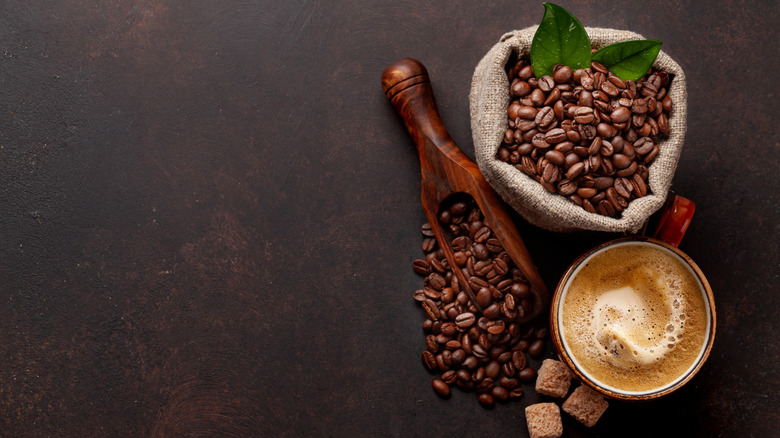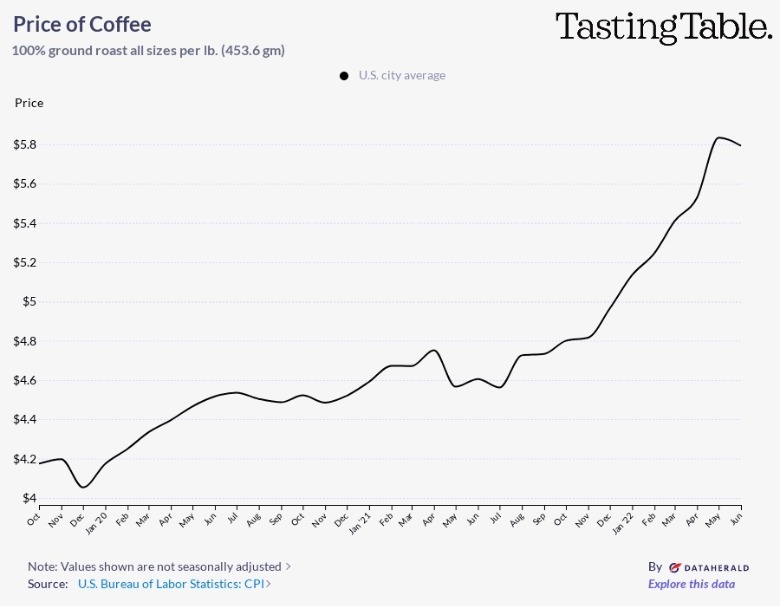How Bad The Increased Price Of Coffee Has Become
Has your grocery bill been uncomfortably high lately? If you live in the U.S., it more than likely has: According to Bloomberg, the record inflation affecting the prices of commonly consumed items ranging from gasoline to utilities is perhaps most marked in the world of food and drink. Factors such as pandemic shutdowns, supply chain issues, and labor disputes have pushed U.S. inflation to its highest levels in 40 years, the outlet reports, and it's hitting Americans hard on their trips to the grocery store.
Bloomberg writes that in some U.S. cities, the price of a loaf of bread has soared to $10, and that other staples such as milk and eggs are also much more expensive than a few years ago. According to data from the U.S. Bureau of Labor Statistics published by Food Dive, the cost of milk went up by nearly 16% from May 2021 to May 2022; Axios, meanwhile, reports that the price of eggs could go up by as much as 21% this year.
And if one of your favorite grocery store purchases is coffee, don't think you're in the clear: As you may have already noticed, the price of this breakfast staple has been going up, up, up recently.
The price of ground coffee has skyrocketed nearly 39% since late 2019
For many of the coffee drinkers among us, breakfast just isn't complete without a dark, robust cup of this caffeinated beverage. And while plenty of us grab a cup to go when we're on the way to work or other morning activities, lots of people enjoy the ritual — and the effects — of brewing their own joe at home. This habit is also a great way to save money, according to TIME, whose number-crunching shows that for the average American drinking two cups of coffee per day, that indulgence could run about $2,000 per year if each and every coffee were purchased at Starbucks. Making that same amount of coffee at home in a drip coffee pot would cost only $46, which is pretty hefty savings.
Here's the thing, though: That article was published a year ago, and the average price of a pound of ground coffee has gone way up since then. According to data sourced from the U.S. Bureau of Labor Statistics and compiled by Tasting Table, the price of coffee has been steadily increasing since October 2019, when its average price per pound in U.S. cities was $4.17. By August 2021, when the TIME article was published, its price had increased by to $4.73 per pound, and in June of this year, the price per pound had leaped again, to a hefty $5.79 — an increase of 38.8% since late 2019.
Why has coffee gotten so expensive?
Given that your favorite coffee destination is also paying more for its beans and is likely passing along rising costs to consumers (via Eat This, Not That!), you're still going to pinch some pennies by purchasing your own coffee and brewing it at home. But as the above data shows, those savings could be less dramatic than in previous years, when coffee was more reasonably priced. If your caffeine preferences have you wincing — whether you fulfill them at a coffee chain or in your own kitchen — you might be wondering: Why is coffee so darn expensive these days?
According to Insider, coffee prices hit multi-year highs last year due to a combination of factors, the most impactful of which was a severe drought in Brazil, the world's largest producer of those fragrant beans we all love. That drought caused a drop in the harvest that the country was able to export, an issue further compounded by the supply chain disruptions caused by the COVID-19 pandemic that have rippled into so many industries, from lumber to oil. Bad news for coffee lovers: Yahoo! reports that inflated prices are expected to remain so through 2022 at least.


